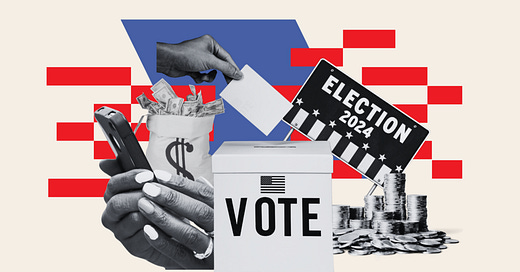Robinhood reminds us that the lines of gambling are blurring
Sharpr is a newsletter breaking down the companies, technology, and trends shaping the future of internet gambling.
Robinhood reminds us that the lines of gambling are blurring
Election betting has been a major talking point in the US presidential race this year.
Prediction market platform Polymarket has consistently provided a real-time pulse check on the odds, while Kalshi recently won a regulatory ruling which allowed the company to offer up election betting to US-based customers.
The most recent statistics show Polymarket has taken in over $3 billion wagers on presidential candidates, while Kalshi has accepted $230M in election-related bets.
But as of last week, there’s a new entrant in the election betting ring: Robinhood.
Last Monday, the trading platform revealed it would allow users to bet on the 2024 election winner through event derivative contracts, where Robinhood earns a $0.01 commission on each transaction.
Since then, over 100 million contracts have been traded on the election, CEO Vlad Tenev said on Sunday.
Robinhood hasn’t outlined plans for other markets it may offer yet, but a blog post tells users to “stay tuned for more event contracts to be added in the future.”
Following the news, industry investor Chris Grove opined that Robinhood has “incredible potential to disrupt the status quo of U.S. online betting.”
Grove points out that Robinhood’s nearly 12M monthly active users dwarfs market leader FanDuel’s reported 3.5M. The brokerage app is also available in every state, including California and Texas, where online sports betting is not.
“It's not evident that Robinhood will be subject to state-based gambling regulation or taxation,” Grove said. “Although it is well-equipped to engage with such regulatory structures if necessary.”
“The brand is strong; the user base is large, predisposed to betting, and has billions on deposit; the corporate core competencies are cross-applicable; and the financial incentives are aligned.”
Sharpr thoughts: Robinhood rolling out election betting is a lot of things, but for me, it’s a good reminder of how the lines of gambling are blurring.
We’ve all heard someone liken the stock market to gambling before. While that could be more or less true depending on how you invest, there’s an intrinsic connection between the two that’s hard to overlook.
As Grove puts it, “trading platforms have absolutely the shortest distance between A and B (where B is a sportsbook) of just about any mainstream digital product I can think of.”
Long before the company launched event contracts on the election, Robinhood was deemed “the brokerage for fun gambling on meme stocks and meme cryptocurrencies,” by Bloomberg’s Matt Levine.
That’s admittedly a one-sided take, but it’s also not wrong.
Robinhood users weren’t ‘investing’ in GameStop during the Reddit-driven frenzy that pushed the stock up nearly 700% in 2021, nor are they taking a position in Dogecoin thinking it’ll be the next Bitcoin. They’re betting on high triple-digit growth and getting out at the right time.
My point is this: ‘Betting’ is no longer this singular thing, and we’re watching consumers discover new ways to gamble and redefine it for themselves in real time.
Especially with the onset of Robinhood, the next generation is increasingly engaging with option trades and temperamental stocks as a new, modern form of gambling. Meanwhile, meme coins (highly volatile cryptocurrencies) are being referred to as “augmented-reality casinos” by some onlookers – even the traders themselves acknowledge this.
There’s many different examples of this happening today: from skin gambling and loot boxes to pop culture prediction markets and more. Even the online casino ‘crash’ games have an uncanny resemblance to what’s happening with meme stocks and meme coins (some more than others).
But when it comes to these market-related experiences, their appeal is similar to what’s driving products like same-game parlays: high volatility, high potential payout, and for those reasons, higher entertainment value for users (even if much riskier).
As acknowledged in the Bloomberg story above, the low-risk index fund investment strategy is now considered "boring" for the chronically-online digital native, and to that end, so is the +120 moneyline.
There’s a behavioral trend unfolding here and an appetite for these types of high-leverage, ‘outside the box’ betting experiences that can and will capture consumer’s attention.
But what’s next is anyone’s guess.
Contact us
News tips, feedback, and sponsorship inquiries.
Reach me directly at luongomanagement@gmail.com 📩 or on Twitter 🐦
Disclaimer: I am a full-time employee of Rivalry. All views and opinions expressed are my own.






Great read